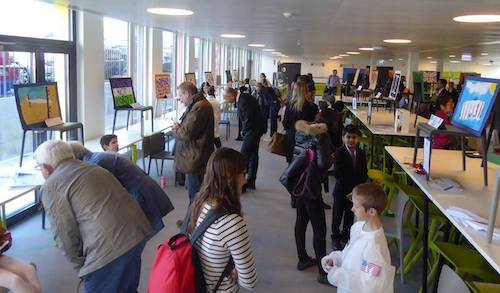Guest Blogs
Knowitall.ch often invites local experts in their field to contribute to their own blogs on our site. This means not only you will benefit from the useful recommendations that we make on our News pages, but you can also profit from some of the great advice and tips that these experts have to make on their favorite subjects. Whilst each of these bloggers has been recommended to us at some point during the evolution of Know-it-all passport and knowitall.ch, obviously we are not able to test out all the suggestions they make on their blogs, nor do we necessarily agree with all their opinions. So if you do find one of their tips useful (or not!), do let us know!
To make these blogs more accessible to you, we have now decided to group them altogether in one section, entitled Guest Blogs, accessible from our main menu bar. We will also post the most recent blogs on the home page of our site in the right hand column.
We are still building up this area of the site, and are looking for bloggers in a number of sections, including Your Home, Travel, and Leisure, so if you feel you have a useful contribution to make in either of these areas, and have the time to submit blog entries approximately every month, then please get in touch!

Photo by Pedro da Silva on Unsplash
By Anna Lascols, Organizing Geneva
Margaret Thatcher said: « Plan your work for today and every day, then work your plan ». Sounds easy. But what if we plan the hell out of our work…and then get stuck?
All of a sudden, there is a white wall in front of us with no door. The project seems too complex anyways. And we will probably fail. It can probably wait a bit. And then something else comes up that looks much more urgent, and interesting, and fun. Like a Facebook ad leading us to an event invite and a blog article like this one… as soon as we look up, three hours are gone and our plan did not work out. Excuses and distractions are ubiquitous and very easy to find. Procrastination is the name of the game.
Yes, your project can wait. And there is enough interesting information out there to keep you busy and excited for the next couple of years. And you will master the situation last minute if needed. Yet, how do you feel after procrastinating? Probably frustrated and exhausted to find excuses and justify your delay. Tired from rescheduling, starting again, never having a free mind.
So what are the actual causes of procrastination? Why does our brain stop us from working our plan? There are technical reasons like the project is actually too complex or we over-estimate the time the task takes. But most of the time, the causes are psychological. Often, we are afraid of failing or succeeding and prefer to stop before heading off into the unknown. Or we are the perfectionist kind and cannot move on unless the tasks are completed to our full satisfaction. Sometimes the underlying reason behind that is actually a lack of self-confidence and a need to prove that we are perfect.
Now, think about the benefits of not procrastinating. If you get your unpleasant tasks out of the way and work your plan, you will be able to reduce your stress and frustrations and enjoy much more free or me-time. Imagine the difference between the kid whose mother has been yelling after for three hours because he kept procrastinating on his homework and the kid who had three hours of free time to play with his mates…

By Tara Lissner, Swiss Gardening School
November brings damp and short days with still lots to do in the garden.
So many colours underfoot while out walking in the woods, a tapestry of tree life, wet and soggy from the downpours and the air fragrant with the scent of damp and decaying leaves - autumn has truly arrived.
My garden is so wet that I'm discouraged from doing too much at the moment, the fact that there has been so much rain does not encourage me and when the dog goes to the door, has a little sniff and turns back into the house I know its not good. But as my list of jobs is increasing by the day, out I go! Read more from the blog here
What's on
This is the season of Sunday openings and special events along with pretty seasonal markets, here are some you may find interesting.
Vernissage de l'Avent, Rémy Jaggi, route de Grens 1, Trélex, Saturday 9 & Sunday 10 November, 16:00-21:00
One of the most beautiful holiday displays will take place this weekend at this innovative florist and nursery in Trélex.
Rémy Jaggi
Château des Bois, Marché de Noël, Chemin de la Combe d'Onex 10, Satigny, Saturday 16 & Sunday 17 November
A magical market filled with seasonal joy.
Château des Bois
Green Christmas Eco Marché, Centre sportif de Founex, route de la Chataigneraie, Thursday 21 & Friday 22 November, 10:00-19:00
The fourth edition of this green market brings together a group of small entrepreneurs with their eye on sustainability. My swiss garden will be present with winter containers filled with seasonal plants and spring bulbs.

By Anna Lascols, Organizing Geneva
Did you know that every hour, 10 billion emails are being sent around the world? Yes, life has become so much easier and faster with the internet, email and cloud services, online communication and bill paying. We have less paper flying around, can research documents by typing their name in the search bar of our computer, find all the information we need on google and store as many files as we want. Everything is virtual, or in other words not physically existing and hence causing no clutter or damage to the planet.
Wait a minute, is that true?
Let’s check some facts on the carbon footprint of those 10 billion emails. What if I told you that every email runs on average through 15,000 km of cables to arrive at destination? That an email with a 1 MB attachment consumes as much as a 25W light bulb during one hour? That data centers in Switzerland consume as much electricity as the canton of Neuchâtel? That 78% of all incoming mails are spams that cause around 20 million tons of CO2 every year? And the list goes on. In reality, the online world has a huge carbon footprint and we contribute to it every time we send an email, store a document or research information.
And not only that. We believe that emails and computer desktops banish all the admin and paper clutter. Yet in reality, we can feel as much overwhelmed by online than by offline or physical clutter. We can’t touch it, but we can see the apps and folders piling up, we lose control over our filing systems, lose time looking for information or retrieve passwords, keep offline duplicates of online invoices to be safe, feel puzzled with the new time saving apps being promoted and are spammed by useless newsletters. We spend much more time on our emails and computer admin as we think, if you don’t believe me keep a time log!
Here a couple of online organizing and energy saving tips:

By Claire Doole, Claire Doole Communications
I vividly remember getting criticised on Twitter for moderating two "manels" - all male panels - during a half-day event at the European Parliament in Brussels some years ago. It would have been a "manference" - a conference where only men speak - if the organisers hadn't remembered to invite one woman to give a presentation.
The organisation, EU Panel Watch, was right to criticise. I should have refused to moderate the all male panels. Unfortunately, moderators rarely get a say in the selection of speakers. I now advise clients on how to design panels and conferences, which are diverse, balanced and engaging - these are the principles I applied when editing BBC radio and TV news programmes.
Still EU Panel Watch's latest annual report on women's representation and speaker diversity on policy panels in Brussels shows change is slow and much more effort is required.
In 2018, out of 1583 speakers at conferences the organisation monitored in the "Brussels bubble", only around one third were women - this held true for panels and keynote speeches. Shockingly, 26% of panels were all men and three quarters of them also had a male moderator. At these rates, EU Panel Watch estimates we can expect to see gender parity in 80 years!

By Mark O'Brien, La Côte International School
The International Primary Curriculum, commonly known as IPC, is a comprehensive, thematic and creative curriculum with specific learning goals for every subject. What makes the IPC stand out from other curricula is the strong focus on developing students as global citizens and becoming internationally-minded. International learning goals are unique to the curriculum and help students to develop an increasingly sophisticated national, international and intercultural perspective. IPC is now taught to over 1,000 students across 90 countries around the world, with many opportunities for students and teachers to share their experiences and learning.
The IPC has been designed to ensure rigorous learning, whilst providing both students and teachers learning opportunities that are exciting, meaningful and active. Through the IPC, the following subjects are covered:
- Geography
- History
- Science
- Art
- Technology
- Computing
- Physical Education
- Music
- Society
- International Learning
The curriculum is split into 3 Mileposts:






